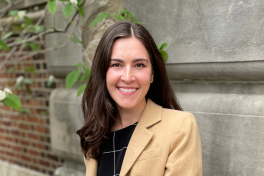Rachel Barry Wade is a PhD student pushing for breakthroughs in campaigning and prosocial messaging by studying how these campaign messages are created and how different people perceive them.

Currently, Wade is working with her advisor, Associate Professor Hillary Shulman, and former peer at Michigan State University Monique Turner on a study about abortion access and racial cues.
“It's really cool the fact that they’re both working together to support me and my idea,” said Wade, “I think it speaks a lot to both of the programs that I was able to make that work.”
After receiving a School of Communication Miller Grant to fund her study, Wade is investigating whether racial cues in mass messaging are positively impactful or have the opposite effect.
“I wanted an issue that could cross the political divide, and the current female approval rating of abortion access is 63 percent,” said Wade. “Second, I wanted an issue that could hit different aspects of identity.”
Wade is focusing on women's perspectives as well as on a racial perspective when it comes to abortion access in this study. How feelings of either activism or fatigue can result from increased abortion access campaigning for Black women compared to white women. Working to find the balance between a prosocial campaign message that recognizes the issue of abortion access, while also not encouraging microaggressions.
Wade reflected on how this phenomenon is saturated in the media, especially in sports. How anti-racist messages can be viewed as a reminder of battles minorities must face, rather than a positive campaign.
“The goal of the study is, hopefully, to provide guidance on how to design messages about racialized issues in ways that motivate action instead of breeding cynicism or fatigue,” said Wade.
This study aligns with Wade’s personal interests as a campaign scholar. She said that understanding the unintended impact campaign messages can have on their target audience is a driving goal of her research program.
“It kept bugging me: do we even know if these things [persuasive messaging] work?” said Wade. “Other than money as an outcome, what other impacts are these messages having?”
Wade has worked on numerous published scholarly articles, such as her Get Out and Talk About It study, involving social influence and message processing. This field experiment revealed a higher response to interpersonal communication rather than the campaign itself. The overlap between interpersonal theory and mass media theory in campaigning is a focus of Wade’s, instead of their individual components.
While at Michigan State University, Wade wrote and tested a campaign for her master’s thesis, concluding that conversations between friends had the largest positive influence on voter turnout.
Another study took place during the COVID-19 pandemic as she and her colleagues at MSU were requested to research how students perceived preventative measures of the pandemic.
They concluded that it was not individual reflection that convinced students to take preventative measures, like wearing a mask, but collective thoughts.
“They weren’t doing these things for themselves,” Wade said.“They’re doing these things to protect their families, their grandparents, the community and other people,” said Wade.
This study exemplified the purpose behind Wade's communication research: to put out a message for your audience to hear and associate with, you must consider the intersectionality of each individual's identity.
Wade will present a paper with Associate Professor Susan Kline at the International Communication Association Conference in June while continuing to work toward her PhD candidacy.
Article by student Norah Hamil
